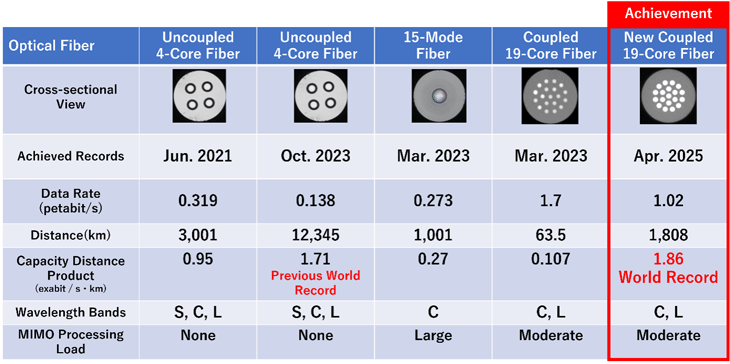
Japanese scientists from the National Institute of Information and Communication Technologies (NICT) established speed record transmission of Internet data at 1.2 Pbps via fiber optic cable over a distance of 1,808 km.
This is enough to download, for example, 10 thousand movies in 4K format or the entire amount of information from Wikipedia in just a second. Support high data transfer rate over long distances has long been a problem, as the signal weakens as it travels over long distances. Strengthening it with more channels in a fiber optic cable is faced with the emergence of obstacles.
To solve this problem, Japanese researchers have developed a special type of fiber optic cable with 19 channels as thick as a hair. Thus, the total thickness of the cable was only 0.125 mm. Each channel transmitted data regardless of the other.
The scientists used a combination of special amplifiers for all 19 channels, preventing their signals from mixing with each other. They created 19 recirculating loops, each using a single fiber channel, and passed the signals through them 21 times to simulate a total distance of 1,808 km.

This fiber optic cable operates efficiently in standard commercial wavelength ranges C and L, thanks to an improved channel layout that reduces signal loss by 40% compared to previous models.
To maintain the integrity over a distance of 1,808 km, the researchers deployed a dual-band optical amplification system consisting of separate devices that amplified signals in the C and L bands. This allowed 180 different wavelengths to transmit data simultaneously using 16QAM modulation, a method that packs more information into each pulse.
At the output, a 19-channel receiver picked up the signals, and a digital processor based on MIMO (multiple-input multiple-output) technology cleansed them, removing interference and calculating the data rate. At the same time, the distance throughput rate was 1.86 exabits per second per km.
Among the remaining challenges are optimizing amplifier efficiency and scaling data processing MIMO. Currently, scientists are studying signal processing based on artificial intelligence to further increase speed.

Spelling error report
The following text will be sent to our editors: